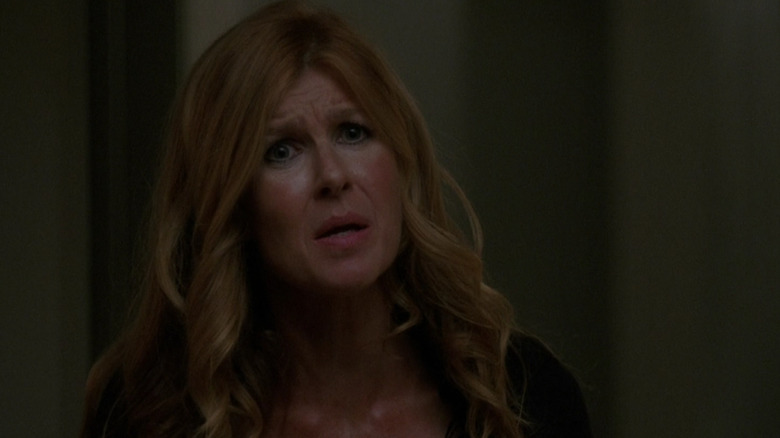AHS: Why Hayden Is Such A Polarizing Character Among Fans
In Ryan Murphy and Brad Falchuk's inaugural and still-beloved season of "American Horror Story," ("AHS: Murder House") audiences got their first taste of what would become a recurring theme and trademark of the duo's specific brand of scary — that is, horror as social commentary. Of the many numerous psychological and societal demons "Murder House" explores (including mental health care, teen depression and violence, school shootings, infidelity, and the human need for both love and fear) there's one particular trope that, to this day, has fans split.
In "Murder House," Kate Mara ("House of Cards") portrayed the character of Hayden McClaine, the much younger student (and mistress) of psychology professor Ben Harmon (Dylan McDermott). After Ben's wife Vivien (Connie Britton) catches Ben in bed with Hayden, the couple attempts to salvage their marriage by moving from Boston to Los Angeles, leaving both Hayden and, ostensibly, Ben's infidelity behind. Unsurprisingly, this plan to patch things up leads to a psychological chaos and emotional cold war aggravated by the fact that the house they move into is, well, a murder house, and Hayden ultimately finds out she's pregnant with Ben's baby.
Not willing to shrink into the background or give up on the man she believes is in love with her, Hayden seeks Ben out in California. Again, unsurprisingly, this plan doesn't go well. Hayden gets murdered and ends up becoming a ghost hell-bent on making Ben and Vivien pay. While some fans sympathize with the young woman's plight, others aren't quite so willing to see her as a victim after she begins terrorizing the Harmons.
Some fans see Hayden's actions as on par with Ben's
Recently, in the "American Horror Story" subreddit, user idk_so_whatever wondered if "Hayden was unstable and obsessed with Ben before her death?"
Although some fans saw both Hayden and Ben as "trash," or felt it was (as one user suggested) "too simplistic" to blame "all of Hayden's mental problems" on her older lover, at least one user felt differently. "She got knocked up by Ben and didn't want him to just leave her with all the responsibility," user ona-winters pointed out, adding that "Ben then kills her and their unborn baby. That would make a woman do some crazy things."
Technically speaking, Ben doesn't murder Hayden himself, it's hard to argue that he's not responsible for her untimely death: Denis O'Hare's Larry Harvey kills Hayden in an effort to ingratiate himself to Ben. While Ben appears appalled at first, he makes zero effort to seek justice for Hayden, and simply buries her body in the backyard, then builds a gazebo over her makeshift grave.
If the "obsessive, pregnant former lover-turned-mental-terrorist" character sounds familiar, it's because Hayden is the contemporary incarnation of Glenn Close's bereft, infuriated Alex Forrest in "Fatal Attraction." Both women's anger and determination are driven less by love and more by the injustice of being treated like they don't exist. In "Fatal Attraction," when the married Dan Gallagher (Michael Douglas) tells his rejected mistress that she's "sick," she responds "Why? Because I won't allow you to treat me like some slut you can just bang a couple of times and throw in the garbage?" Similarly, Hayden says, "I'm not a whore, Ben! I matter!" She repeats this in a later episode to Vivien, saying, "I'm not some silly school girl, I'm a woman, and I matter."
Hayden and Vivien are two sides of an old trope
In "Murder House," Hayden's "woman scorned" character is Murphy's way of calling out society's apparent willingness to see the consequences of an unfaithful man's actions as the fault (or overreaction) of the rejected woman. Even viewers who have little love for Ben have a hard time seeing Hayden as a victim.
And yet, far more so than Alex in "Fatal Attraction," Hayden is very much a victim. As a psychologist, Ben knows better than most that when the power dynamic between two people is imbalanced (in this case, he is Hayden's professor) any romantic relationship stemming from that dynamic is, necessarily, an abuse of power and authority. Ben even goes so far as to admit to this, though he does so only after Hayden is already dead.
It's also important to note that Vivien — as another victim of Ben's infidelity and gaslighting — is almost universally viewed as a wholly innocent victim. Just as Season 9 ("1984") pitted the "slutty" Montana Duke (Billie Lourd) against the "virginal" Brooke Thompson (Emma Roberts), Season 1 uses betrayed wife Vivien and scorned mistress Hayden to call-out the age-old depiction of women in literature and film as either The Virgin or The Whore. By becoming pregnant with the Anti-Christ, Viv acts as an inversion of the Virgin Mary. As for Hayden's obsessive, murderous temptress character — who some fans still feel is "trash" — Murphy's decision to have her character not just abandoned, but murdered, makes the unjust treatment of sexual females in literature (e.g., The Bible) and film into something tangible. Hayden isn't just rejected, deprived, and hated. She is killed off to preserve Ben's relationship with "the good girl."
That some people view Viv and Hayden's plights or victimization as a zero-sum game (if one is justified, the other cannot be) is proof that "American Horror Story" has been using characters to force viewers to investigate their own biases since 2011.


